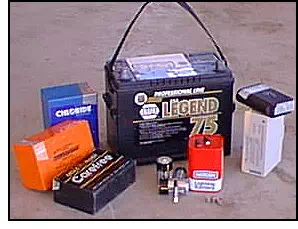Dental Offices Solid Wastes - Universal Waste
Overview
Universal waste is a special subcategory of hazardous waste. These are specific wastes that are widely generated and can be easily recycled, which prevents them from be disposed of in landfills or municipal incinerators. To foster recycling efforts for such wastes, EPA issued the Universal Waste Rule in 1995 as an amendment to the Resource Conservation and Recovery Act (RCRA). This federal regulation provides an alternative and less stringent set of management standards for four specific types of hazardous waste:
- Batteries that are spent and will not be regenerated either at a place of business or at a battery recycling/reclamation facility. Types of batteries that a dental office may generate that would be universal wastes include those in electronic equipment, mobile telephones, portable computers, and emergency backup lighting. Common non-rechargeable alkaline batteries (AAA, AA, C, D, 9-volt) are generally non-hazardous, but should be disposed of at a reclamation facility to be safe. Also, some states have deemed all batteries as hazardous waste when discarded, and have banned the disposal of batteries with other domestic waste (e.g., California).
- Mercury thermostats including healthcare thermometers and HVAC temperature control devices containing metallic mercury.
- Mercury-containing light bulbs, including compact fluorescent light bulbs (CFLs) after they burn out.
- Pesticides that have been suspended or canceled including those that are part of a voluntary or mandatory recall under the Federal Insecticide, Fungicide, and Rodenticide Act (FIFRA) or by the pesticide registrant; are unused but managed as part of a waste pesticide collection program; or are obsolete or damaged.
States have autonomy when it comes to the universal waste rule. They do not have to accept it, they can add or remove wastes, or they can have more stringent requirements. Thus, before you designate any hazardous waste as a universal waste, you will need to check the Universal Waste State Resource Locator to see if your state agency will allow it. Most states follow the federal rule, but there are some important exceptions.
Universal Waste Rule
The Universal Waste Rule establishes requirements applicable to two categories of universal waste generators:
- A small quantity handler of universal waste (SQHUW). Accumulate less than 11,000 pounds (5,000 kg) of total universal waste, (i.e., batteries, pesticides, mercury thermostats or mercury containing lamps) for periods up to one year.
- A large quantity handler of universal waste (LQHUW). Accumulates 11,000 pounds (5,000 kg) or more of total universal waste for periods up to one year.
Nearly all dental offices fall under the small quantity handler category (an exception may be a dental office that is part of a university). Small quantity handlers must:
- Ensure that any universal wastes they are accumulating are managed in a closed container that prevents the release of the universal waste or waste components.
- Label each container with the type of universal waste it contains.
- Accumulate its universal waste no longer than one year from the date the waste was generated, and maintain records demonstrating the actual generation date.
- Ensure all employees handling a universal waste have been provided information on proper handling and emergency procedures appropriate to the types of wastes managed.
- Send its universal waste to another universal waste handler or a permitted facility.
- Universal waste shipments may be transported by a contracted transporter or by the small quantity handler of universal waste.
- Small quantity handlers are not required to use a uniform hazardous waste manifest or keep records of universal waste shipments. However, it is highly recommended such records be maintained.
State Regulations
Many states have expanded the list of universal wastes to include spent materials such as electronics. Also, some state rules vary with respect to generator categories and waste management requirements. To find out how universal wastes are regulated in your state, see the Universal Waste State Resources Locator.
More Information
For more detailed information on universal waste regulations and management, see HERC's Universal Waste section and the Universal Waste State Resources Locator.
Specific requirements of the universal waste rule can be found at 40 CFR 273.



